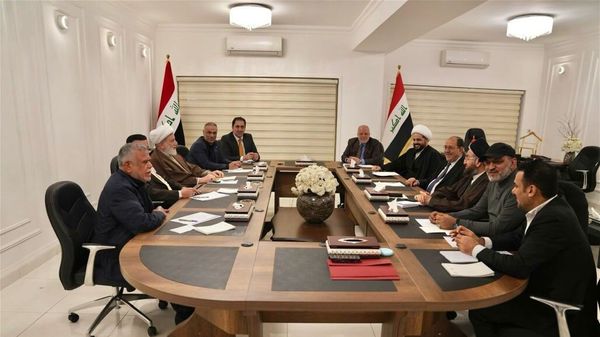Al-Ma'ulouma News Agency wrote in its analytical report that the future Iraqi government will not be formed outside the "Shiite Coordination Framework" coalition, but will emerge from within it.
According to Ashura News, citing the Iraqi news agency Al-Ma’alumah, despite the different positions of the political movements and the lack of clarity of the new political picture and map of Iraq, the goal agreed upon by all is that the new government be born from within the coordination framework and not emerge from any other (political) party outside this framework. Although there is speculation about the duration of the process of forming the future government and predictions about the difficulty of this process, the final result is the emergence of a new government with the agreement of the movements and formations that make up the Shiite coordination framework.
Iraqi parliamentarian Mukhtar Al-Musawi told Al-Ma’alumah News Agency: The announcement of the initial results of the parliamentary elections by the High Election Commission has clarified the necessary picture regarding the political weight and position of the parties and political movements, including the parties and movements subordinate to the Shiite coordination framework or the Sunni, Kurdish, and Turkmen political parties and movements.
He added: "Consultations have begun after the election results were announced, and we have witnessed preliminary meetings held to reach understandings through which a roadmap for the nature of future political coalitions that will lead to the formation of a government will be drawn."
Al-Musawi continued: "Given the differences between political forces, the formation of the future government will not be easy, but rather complicated, and its formation may require at least five to six months. This period can be reduced if the disputed issues are resolved and an understanding is reached between effective and active political forces."
Iraqi political analyst Ibrahim al-Sarraj also told Al-Ma'alumah: "Within the framework of Shiite coordination, there is an agreement to continue the political process and form a new government. Some differences may arise regarding positions, but these differences will be resolved quickly and according to the political weight of each organization within the framework of Shiite coordination; especially since the framework of Shiite coordination has determined a series of principles and criteria that are agreed upon by the organizations and currents under its umbrella."
He added: This may be the beginning of forming a new government that is better than its previous governments.
Al-Sarraj explained: The political majority within the framework of Shiite coordination is committed to the option of overcoming any possible differences of opinion in order to lead the political process towards forming a new government within this framework.
In this context, Abbas al-Maliki, an independent Iraqi politician, told Al-Ma’alumah: The parties and movements participating in the recent parliamentary elections have a single view on the need to accelerate the formation of a government and advance political and administrative affairs, in a way that preserves the stability of the country and the continuity of its institutions, because the current differences have not reached a level that will cause a deadlock and can be overcome through dialogue and understanding.
He added: The Shiite, Sunni and Kurdish groups in Iraq agree on one goal, which is to continue the political process and not undermine it.
Al-Maliki added: This convergence between different forces and currents indicates the country's "political maturity and collective desire to strengthen national stability."
According to IRNA, the sixth round of Iraqi parliamentary elections was held on November 11, 2025. The parliamentary elections are considered the most important elections in Iraq because, in addition to electing 329 members of parliament, the Iraqi parliament is responsible for electing the president in the first session of parliament, and the president is required to appoint a prime minister candidate from among the largest parliamentary faction to form the government cabinet in the same first session of parliament.
After selecting the members of his cabinet team, the prime minister must introduce his ministers to parliament to obtain a vote of confidence, and if the members of parliament grant a vote of confidence, the government can begin its official activities for four years.
The Iraqi High Election Commission announced in the preliminary results of the 2025 parliamentary elections that the "Prosperity and Development" coalition, close to the current Iraqi Prime Minister "Mohammad Shia Al-Sudani", came in first place in Baghdad province with 411,026 votes, and the results of other Iraqi provinces are also being announced.
The Independent High Election Commission announced the final participation rate in the parliamentary elections at 56.11 percent, and based on the preliminary results in Baghdad, the "Prosperity and Development" coalition of Mohammed Shia Al-Sudani, the "Progress Coalition" led by Mohammed Al-Halbousi, and the "State of Law Coalition" led by Nouri Al-Maliki won the most votes.
The Independent High Election Commission of Iraq announced: The manual counting and recounting process of votes was carried out and the results were 100% consistent.
The commission clarified: These are the preliminary results of the election and there is no possibility of objecting to them until the results are finalized.


Post a comment